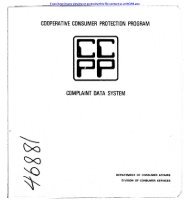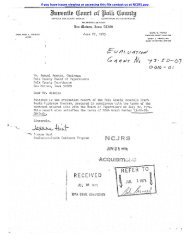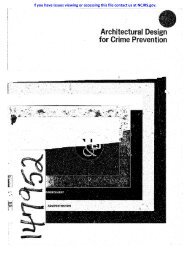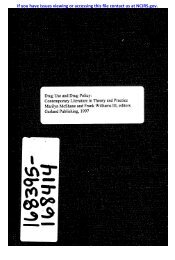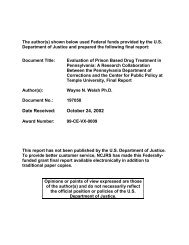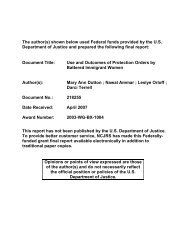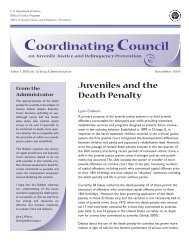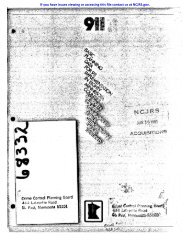Conflict Resolution Education - National Criminal Justice Reference ...
Conflict Resolution Education - National Criminal Justice Reference ...
Conflict Resolution Education - National Criminal Justice Reference ...
Create successful ePaper yourself
Turn your PDF publications into a flip-book with our unique Google optimized e-Paper software.
wards can avoid consequences that could lengthen<br />
their stay at the facility. The program has a significant<br />
impact on conflict managers, helping them to<br />
increase their self-esteem, learn to resolve conflicts<br />
peacefully, and improve academic achievement.<br />
Working with facilities in three Bay Area counties<br />
of California, the Community Board conducted extensive<br />
staff development work that included building<br />
and training a Site Leadership Team, developing<br />
online counselors as conflict manager trainers, and<br />
developing a program plan based on the facilities’<br />
needs and staff input. Within a period of 9 months<br />
to a year, the Community Board staff trained at least<br />
3 groups of 15 young men as conflict managers at<br />
each facility, leaving each with a solid, well-prepared<br />
team of trainers to continue periodic training of new<br />
conflict managers.<br />
Learning mediation has helped me to realize<br />
that there are other methods of solving your<br />
problems other than violence. It has also<br />
helped me to deal with different types of<br />
people.<br />
16-year-old resident,<br />
Youth Diagnostic and Development Center<br />
After 3 years, <strong>Conflict</strong> Manager programs in juvenile<br />
facilities are ongoing, and trained youth are helping to<br />
resolve disputes for their peers every day. Peer mediation<br />
programs have reduced the number and seriousness<br />
of conflicts and rule infractions and have limited<br />
staff time spent on discipline.<br />
A survey completed at the end of their training<br />
asked conflict managers where they thought they<br />
might be able to use their new skills other than participating<br />
in the <strong>Conflict</strong> Manager program. Nearly<br />
every ward wrote that the skills would be useful<br />
in other settings—with family, at a job, or with<br />
neighborhood friends. At Holden Ranch, a conflict<br />
manager who graduated from the facility called a<br />
counselor several months later to say that conflict<br />
50<br />
resolution skills had helped him change his difficult<br />
relationship with his mother.<br />
Studies of recidivism have found that wards are less<br />
likely to return to the correctional system if they have<br />
steady employment. Other studies show that graduates<br />
of juvenile facilities often lose jobs not because they<br />
lack technical skills, but because they are unable to resolve<br />
problems with co-workers, supervisors, or employers.<br />
Thus, it is likely that conflict managers will<br />
stay out of the correctional system after they leave the<br />
facility. This may be the most important long-term<br />
impact of the conflict manager training program.<br />
Alternative Schools<br />
Students in most alternative schools do not differ<br />
substantially from students in other schools when it<br />
comes to conflict and do not need to be treated differently<br />
when developing and implementing a conflict<br />
resolution program. Some alternative schools enroll<br />
youth with behavioral/emotional disorders, including<br />
students who have dropped out or are at risk of dropping<br />
out. Many of these youth are involved in the<br />
court system and may be in an alternative school because<br />
of court dictates. Some are teen parents; some<br />
are homeless; others are involved in substance abuse.<br />
Although many of these students are intellectually<br />
capable, they have often failed academically.<br />
These alternative schools offer a place for students<br />
who have demonstrated, in one or many ways,<br />
that their behavior is unacceptable in a regular<br />
school. Often the participants in these alternative<br />
schools have demonstrated the potential for selfdestructive,<br />
antisocial, or violent behavior. Most<br />
students placed in such alternative schools need<br />
conflict resolution education because they have<br />
experienced numerous conflicts involving other<br />
youth, school staff members, and school expectations<br />
or rules. They are often in these alternative<br />
schools because they escalated rather than deescalated<br />
a dispute. These students are clearly prime<br />
candidates for conflict resolution education. The<br />
following section describes a conflict resolution<br />
program in an alternative school in New York.



